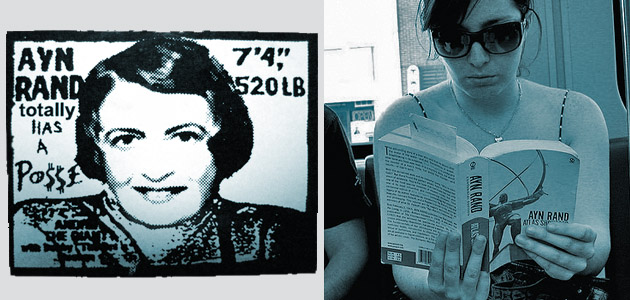 Wikimedia Commons, Seth Tisue/Flickr
Wikimedia Commons, Seth Tisue/Flickr
 “I grew up on Ayn Rand,” Rep. Paul Ryan (R-Wisc.) recounted in a speech before the Atlas Society in 2005. The future vice presidential nominee went on to explain how the author of Atlas Shrugged and The Fountainhead inspired him to enter public service, adding that her books were “required reading” for his Congressional staff and interns. “There is no better place to find the moral case for capitalism and individualism than through Ayn Rand’s writings and works,” he concluded.
“I grew up on Ayn Rand,” Rep. Paul Ryan (R-Wisc.) recounted in a speech before the Atlas Society in 2005. The future vice presidential nominee went on to explain how the author of Atlas Shrugged and The Fountainhead inspired him to enter public service, adding that her books were “required reading” for his Congressional staff and interns. “There is no better place to find the moral case for capitalism and individualism than through Ayn Rand’s writings and works,” he concluded.
Though Ryan has since tried to distance himself from Rand, his youthful devotion to the founder of Objectivism is not uncommon. Celebrities, a former Federal Reserve chairman, tech entrepreneurs, and tea partiers have claimed her as an inspiration, citing her unapologetic advocacy of selfishness, the pursuit of wealth, and unfettered capitalism. Rand’s writings and ideas are arguably more influential now than ever.
Here are some longreads about Rand’s personal history, her philosophy, her fans and foes, and her impact. For more longform stories from the pages of Mother Jones, check out our longreads archive.
“Possessed” | Thomas Mallon | The New Yorker | November 2009
If anything can be said about Rand, it’s that she evokes strong reactions from readers. Reviewing two recent biographies of Rand, Mallon explores the cultish devotion she inspired, starting with the acolytes who began following her in the 1950s.
The young libertarians beginning to gather at Rand’s feet in her Murray Hill apartment called themselves, with less irony than they believed, the Collective. Among them was Alan Greenspan, whom Rand nicknamed the Undertaker. By most accounts, the future Federal Reserve chairman behaved with less slavish subordination than the other self-professed individualists, who regarded Rand, according to Burns, “as a genius without compare.” The philosopher’s most famous directive was “Check your premises,” but those in her orbit never dared question hers. They adopted Rand’s tastes in everything from furniture to music (Rachmaninoff, good; Brahms, bad), and tightened themselves into a circle that came to be governed by loyalty tests and living-room show trials.
“The Bitch Is Back” | Andrew Corsello | GQ | October 2009
Rand’s diehard fans can be as abrasive as she was. Corsello identifies the most extreme kind: the Ayn Rand Asshole. Take this guy:
Does Michael Malice admit to being an unreconstructed 33-year-old Ayn Rand Asshole? He does not—he proclaims it. “My reviews were incredible,” he says of 2006’s Ego & Hubris, the story of his life that Harvey Pekar of American Splendor fame told in graphic-novel form. “The Village Voice called me ‘the face of jackassery.’ Your magazine called me a ‘slacker genius.’ Did you know that? The Onion called me ‘a hateful blowhard who touts his genius-level intellect and dismisses most of the world as inferior, deluded, or hypocritical.’ They also called me a ‘human cockroach,’ because I’m indestructible. Which I am.”
“Ayn Rand, in Spades” | John Hodgman | The New York Times Magazine | June 2003
Not all Randians are flaming ARAs. Hodgman entertainingly profiles a bridge champion who credits Objectivism for his success, to the annoyance of his fellow players.
But the heroic man does not require acceptance. Consider “Atlas Shrugged.” After Francisco D’Anconia delivers his “Money is the root of all good” speech to a party of government moochers, fey intellectuals and moneyed socialists, he leaves them all to rejoin his fellow titans of industry and science in a place called Galt’s Gulch. The gulch is the Objectivist utopia, a refuge for the heroic thinkers whom the world has rejected. In many ways it resembles a bridge tournament: thick with C.E.O.’s (Warren Buffett is a renowned player of the game, and Bill Gates made an appearance at last year’s World Championships in Montreal) and as far away from the real world as it gets.
“Ayn Rand at 100” | Cathy Young | Reason | March 2005
Though Rand herself rejected the libertarian movement, she’s still held in high regard by many libertarians. In this piece written for Rand’s centennial, Young meditates on her contemporary appeal for opponents of big government.
While Rand was hardly the first philosopher to advocate an ethos of individualism, reason, and self-interest, no one formulated it as accessibly or persuasively as she did—or as passionately. In Rand’s hands, the “virtue of selfishness” was not a dry, abstract rationalist construct with a bloodless “economic man” at its center. It became a bold, ardent vision of defiance, struggle, creative achievement, joy, and romantic love.
“Big Sister is Watching You” | Whitaker Chambers | The National Review | December 1957
While conservatives such as Ryan have found common ground with Rand, she’s had her share of critics on the right. In this 1957 piece, Chambers, an ex-Communist turned conservative (who testified before the House Un-American Activities Committee), objects to the misanthropy and “dictatorial tone” of Atlas Shrugged.
Out of a lifetime of reading, I can recall no other book in which a tone of overriding arrogance was so implacably sustained. Its shrillness is without reprieve. Its dogmatism is without appeal. In addition, the mind which finds this tone natural to it shares other characteristics of its type. 1) It consistently mistakes raw force for strength, and the rawer the force, the more reverent the posture of the mind before it. 2) It supposes itself to be the bringer of a final revelation. Therefore, resistance to the Message cannot be tolerated because disagreement can never be merely honest, prudent, or just humanly fallible. Dissent from revelation so final (because, the author would say, so reasonable) can only be willfully wicked. There are ways of dealing with such wickedness, and, in fact, right reason itself enjoins them. From almost any page of Atlas Shrugged, a voice can be heard, from painful necessity, commanding: “To a gas chamber—go!”
“And the Rand Played On” | Amy Benfer | Mother Jones | July 2009
But where some see hectoring prose, others see a call to action. Not long after Obama’s election, conservative pundits declared that they planned to “Go Galt,” taking their cues from John Galt, the single-minded protagonist of Atlas Shrugged. Benfer dissects the embrace of Rand in the tea party era.
Rand’s particular genius has always been her ability to turn upside down traditional hierarchies and recast the wealthy, the talented, and the powerful as the oppressed. This topsy-turvy philosophy has echoed through the blame-the-victim ranting of CNBC host Rick Santelli and the tax-day tea parties. In this world, it is not possible to admit that the rich and the Republicans may have been undone by their own greed and cluelessness. Instead, the Galters have rewritten the story of how we got here with a dash of idealistic fantasy and a side of empty rebellion.

















